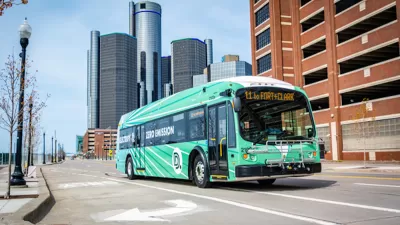Released earlier this week by the Institute for Economics and Peace, the annual United States Peace Index (USPI) analyzes peacefulness at the state and city levels, and the costs associated with violence. Richard Florida discusses its findings.
Measuring peacefulness according to five indicators: the number of homicides, number of violent crimes, the incarceration rate, number of police employees and the availability of small arms, the USPI indicates that, "the United States is significantly less violent and more peaceful than it used to be." However, "the U.S. remains significantly less peaceful than other advanced nations," and as Florida notes, "It is one of only two OECD nations that are not among the top 50 most peaceful nations in the world."
At the state level, the report indicates that, "New England ranks as the nation's most peaceful region with the lowest scores," with Maine declared "the most peaceful state for the 11th consecutive year." On the other end of the spectrum, "Louisiana is the least peaceful state on the State Peace Index, followed by Tennessee, Nevada, Florida, and Arizona."
This year is the first time that the study ranked the peacefulness of the 61 most populous metropolitan areas in the country, with Cambridge, MA coming out on top and Detroit on the bottom.
Florida finds correlations between violence and a number of socio-economic factors including education, religiosity, political orientation, and teen pregnancy rates.
According to Florida, "Two factors that stand out are poverty and inequality. Higher levels of violence and lower levels of peace are closely associated with both, at the state and metro levels. The report finds one of the very highest correlations between lack of peace and the percentage of children living in single parent households."
FULL STORY: The Most (and Least) Peaceful Places in America

Planetizen Federal Action Tracker
A weekly monitor of how Trump’s orders and actions are impacting planners and planning in America.

Maui's Vacation Rental Debate Turns Ugly
Verbal attacks, misinformation campaigns and fistfights plague a high-stakes debate to convert thousands of vacation rentals into long-term housing.

Restaurant Patios Were a Pandemic Win — Why Were They so Hard to Keep?
Social distancing requirements and changes in travel patterns prompted cities to pilot new uses for street and sidewalk space. Then it got complicated.

In California Battle of Housing vs. Environment, Housing Just Won
A new state law significantly limits the power of CEQA, an environmental review law that served as a powerful tool for blocking new development.

Boulder Eliminates Parking Minimums Citywide
Officials estimate the cost of building a single underground parking space at up to $100,000.

Orange County, Florida Adopts Largest US “Sprawl Repair” Code
The ‘Orange Code’ seeks to rectify decades of sprawl-inducing, car-oriented development.
Urban Design for Planners 1: Software Tools
This six-course series explores essential urban design concepts using open source software and equips planners with the tools they need to participate fully in the urban design process.
Planning for Universal Design
Learn the tools for implementing Universal Design in planning regulations.
Heyer Gruel & Associates PA
JM Goldson LLC
Custer County Colorado
City of Camden Redevelopment Agency
City of Astoria
Transportation Research & Education Center (TREC) at Portland State University
Jefferson Parish Government
Camden Redevelopment Agency
City of Claremont





























